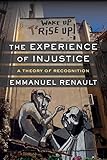The Experience of Injustice : A Theory of Recognition / Emmanuel Renault.
Material type: TextSeries: New Directions in Critical Theory ; 70Publisher: New York, NY : Columbia University Press, [2019]Copyright date: ©2019Description: 1 online resourceContent type:
TextSeries: New Directions in Critical Theory ; 70Publisher: New York, NY : Columbia University Press, [2019]Copyright date: ©2019Description: 1 online resourceContent type: - 9780231177061
- 9780231548984
- 303.372
- HM671 .R4613 2019
- online - DeGruyter
- Issued also in print.
| Item type | Current library | Call number | URL | Status | Notes | Barcode | |
|---|---|---|---|---|---|---|---|
 eBook
eBook
|
Biblioteca "Angelicum" Pont. Univ. S.Tommaso d'Aquino Nuvola online | online - DeGruyter (Browse shelf(Opens below)) | Online access | Not for loan (Accesso limitato) | Accesso per gli utenti autorizzati / Access for authorized users | (dgr)9780231548984 |
Frontmatter -- CONTENTS -- TRANSLATOR'S NOTE -- PREFACE -- INTRODUCTION. Political Philosophy and the Clinic of Injustice -- PART I Injustice and the Denial of Recognition -- Chapter One. SOCIAL MOVEMENTS AND CRITIQUE OF POLITICS -- Chapter Two. THE APORIAS OF SOCIAL JUSTICE -- Chapter Three. THE INSTITUTIONS OF INJUSTICE -- PART II The Politics of Identity and Politics in Identity -- Chapter Four. IDENTITY AS THE EXPERIENCE OF INJUSTICE -- Chapter Five. A DEFENSE OF IDENTITY POLITICS -- PART III Social Suffering -- Chapter Six. SOCIAL CRITIQUE AS A VOICE FOR SUFFERING -- Chapter Seven. RECOGNITION AND PSYCHIC SUFFERING -- CONCLUSION. Critique as a Voice Against Injustice -- NOTES -- INDEX -- NEW DIRECTIONS IN CRITICAL THEORY
restricted access online access with authorization star
http://purl.org/coar/access_right/c_16ec
In The Experience of Injustice, the French philosopher Emmanuel Renault opens an important new chapter in critical theory. He brings together political theory, critical social science, and a keen sense of the power of popular movements to offer a forceful vision of social justice. Questioning normative political philosophy's conception of justice, Renault gives an account of injustice as the denial of recognition, placing the experience of social suffering at the heart of contemporary critical theory.Inspired by Axel Honneth, Renault argues that a radicalized version of Honneth's ethics of recognition can provide a systematic alternative to the liberal-democratic projects of such thinkers as Rawls and Habermas. Renault reformulates Honneth's theory as a framework founded on experiences of injustice. He develops a complex, psychoanalytically rich account of suffering, disaffiliation, and identity loss to explain these experiences as denials of recognition, linking everyday injustice to a robust defense of the politicization of identity in social struggles. Engaging contemporary French and German critical theory alongside interdisciplinary tools from sociology, psychoanalysis, socialist political theory, social-movement theory, and philosophy, Renault articulates the importance of a theory of recognition for the resurgence of social critique.
Issued also in print.
Mode of access: Internet via World Wide Web.
In English.
Description based on online resource; title from PDF title page (publisher's Web site, viewed 02. Mrz 2022)


